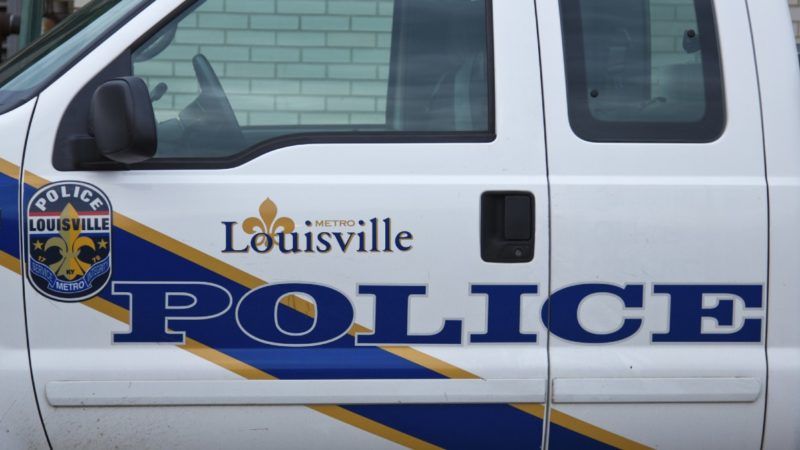Feds To Investigate Death of Breonna Taylor After Botched Kentucky Narcotics Raid
Louisville Metro Police Department said officers identified themselves in a no-knock raid. Neighbors said that's not true.

Attorneys for the family of Breonna Taylor, a woman killed by the Louisville Metro Police Department (LMPD), say Taylor is dead because of police carelessness. Officers with the LMPD killed Taylor during a no-knock raid, during which they also arrested her boyfriend for trying to defend the couple. After two months of internal investigation by the LMPD, the circumstances around Taylor's death will now be reviewed by the federal government.
According to a press conference held by attorney Brian Crump, on March 13 Taylor was home asleep with boyfriend Kenneth Walker when LMPD served a no-knock narcotics raid on their home. Crump says the officers used a battering ram to break down the door and that the couple called 911 believing they were victims of a home invasion.
Walker, who Crump said is a registered gun owner, shot in the direction of the officers, hitting Officer Jon Mattingly in the leg. Police shot back. Taylor was shot eight times and died. Crump said that the LMPD asked Taylor's mother soon after the shooting if she and Walker were having issues, which he believes means that the department wanted to pin Taylor's death on Walker. To complicate matters further, in an affidavit filed immediately after the raid, the LMPD referred to Taylor as the shooter.
Walker was arrested and indicted for felonious assault and the attempted murder of a police officer. The indictment accused Walker of "manifesting extreme indifference to the value of human life when he wantonly engaged in conduct which created a grave risk of death."
In response to a request for comment, LMPD referred back to a press conference held on March 13, hours after Taylor was killed. In that press conference, the LMPD says that around 12:40 a.m., members of the Criminal Interdiction Division "knocked on the door several times and announced their presence as police who were there for the search warrant." The officers then forced entry and were met by Walker's gunfire. Mattingly was injured and the other officers returned fire. The officers were placed on administrative leave while the LMPD conducted an internal review.
Crump said the officers did not attempt to identify themselves peacefully or give the couple time to respond. At least four neighbors told lawyers that LMPD officers never knocked or identified themselves before the exchange of gunfire. The Criminal Interdiction Division, which investigates "violent street gangs, armed career criminals as well as criminal enterprises involving gang members," is not issued body-worn cameras, and so LMPD does not have video footage of the incident.
According to the search warrant obtained by Reason, LMPD Detective Joshua Jaynes told a court he had probable cause to believe that Walker and a man named Jamarcus Glover were supplying drugs to a "trap house" approximately 10 miles, or 20 minutes, away from Taylor's apartment. Taylor's apartment was named on the warrant because Glover was seen picking up a package from the residence. A U.S. Postal Inspector confirmed that Glover occasionally received mail at Taylor's apartment.
Crump refuted this, saying Glover only received one package from Taylor's apartment in January. Sam Aguiar, the local lawyer for Taylor's family, also questioned why the LMPD didn't pull Glover over when they observed him receiving the package, noting that Glover is pulled over at least once a month.
At the end of the warrant, Jaynes requested a no-knock raid on Taylor's apartment.
"[Jaynes] is requesting a No-Knock entry to the premises due to the nature of how these drug traffickers operate," the warrant states, arguing, "These drug traffickers have a history of attempting to destroy evidence, have cameras on the location that compromise Detectives once an approach to the dwelling is made, and [have a] history of fleeing from law enforcement."
Despite video evidence to support the police version of events, the LMPD has painted Walker as an attempted cop killer. Upon learning that a judge had granted him home incarceration in March in response to the COVID-19 pandemic, the River City Fraternal Order of Police released a statement condemning the decision.
"Just one week ago, this man violently attacked our officers, and was charged with attempted murder after shooting a sergeant! Not only is he a threat to the men and women of law enforcement, but he also poses a significant danger to the community we protect!" they wrote.
After receiving national attention in the past week, however, both Taylor and Walker may very well be vindicated. Louisville Mayor Greg Fischer and LMPD Chief Steve Conrad announced on Thursday that they asked the FBI and the U.S. Attorney for the Western District of Kentucky to review the internal investigation of Taylor's death.
The dispute over whether police adequately identified themselves have led critics of police shootings to draw comparisons between Taylor's death and that death of Atatiana Jefferson in Fort Worth, Texas, last October. Body-worn camera footage showed now-former officer Aaron Dean conducting a welfare search at Jefferson's home at the request of a neighbor. Dean, who neighbors say did not identify himself, saw Jefferson through her window, shouted at her to put her hands up, and then shot her fatally. Dean has since been indicted for murder.
Regardless of whether police announced themselves before breaking down the couple's door, Taylor is yet another example of how aggressive, no-knock SWAT raids can end in tragedy.


Show Comments (44)